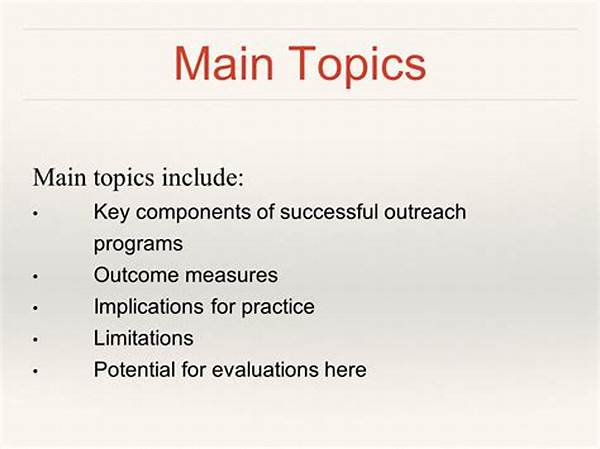Hey there, fellow explorers of spirituality and community impact! Today, we’re diving into something pretty intriguing—the magical world of spiritual outreach programs and how we tally up their impact. Ever wondered whether these programs are truly making a difference? Well, that’s what a spiritual outreach program outcome evaluation is all about. Buckle up, and let’s explore this journey together!
Read More : Frequently Played Gospel Hymns
Understanding Spiritual Outreach Program Outcome Evaluation
Picture this: a group of passionate individuals coming together to create ripples of positive change in their community through spiritual outreach programs. It’s heartening, right? But how do we know if these efforts are hitting the mark? That’s where spiritual outreach program outcome evaluation comes in. It’s like a roadmap that helps us see the big picture.
When evaluating these programs, we focus on the various aspects like participant engagement, personal growth, and community enhancement. The idea is to gather data that tells a story—a story about how these initiatives are transforming lives. We dive deep into metrics, feedback, and testimonials to find out what’s working and what isn’t. It’s a little like being a detective on a mission to uncover the truth about impact!
By engaging in a thorough spiritual outreach program outcome evaluation, we gain insights into the efficacy of the program and areas of improvement. Whether it’s fostering a sense of belonging or promoting inner peace, these evaluations help us gauge the success and chart a course for future programs.
Key Components of Spiritual Outreach Program Outcome Evaluation
1. Participant Feedback: Gathering feedback is crucial for a spiritual outreach program outcome evaluation. It provides insights into the participants’ experiences and their personal growth.
2. Goal Achievement: Evaluating whether the program met its intended goals helps in understanding its effectiveness and areas needing improvement.
3. Community Impact: Understanding the broader impact on the community can reveal the program’s reach and influence, which is a significant aspect of spiritual outreach program outcome evaluation.
4. Engagement Levels: Measuring participant engagement helps in assessing the program’s appeal and receptivity among attendees.
5. Personal Transformation: Evaluating personal growth stories and transformations can be enriching while conducting a spiritual outreach program outcome evaluation.
Why Does Spiritual Outreach Program Outcome Evaluation Matter?
You might be wondering, why go through all this effort? Well, a spiritual outreach program outcome evaluation is like holding up a mirror to our efforts. It reveals both the glowing highlights and the shadows that need addressing. The aim is to harness success and learn from stumbles, all in the spirit of growth.
Through this process, we can determine if the programs align with their spiritual intentions and mission. It’s about ensuring that the time, energy, and resources invested are yielding fruit. And in the grand scheme of things, it’s this evaluation that helps us scale greater heights, evolving our approaches to resonate even more profoundly with the community.
The long-term benefits? Enhanced program quality, better resource allocation, and a more satisfied community. It’s a win-win! Spiritual outreach program outcome evaluation fosters a cycle of continuous development, allowing these beautiful initiatives to spread their wings even wider.
How To Conduct A Fruitful Spiritual Outreach Program Outcome Evaluation
1. Define Clear Objectives: Having crystal-clear goals from the onset simplifies the spiritual outreach program outcome evaluation process.
Read More : “online Religious Music Networks”
2. Incorporate Diverse Metrics: Using a variety of metrics paints a fuller picture of the program’s impact and outcomes.
3. Encourage Open Feedback: Fostering an environment for open dialogue encourages honest feedback essential for an effective spiritual outreach program outcome evaluation.
4. Utilize Qualitative and Quantitative Data: Combining both qualitative and quantitative data offers a comprehensive understanding of results and insights.
5. Reflect and Adapt: Use the findings from the spiritual outreach program outcome evaluation to reflect on the processes and adapt for future improvements.
Challenges in Spiritual Outreach Program Outcome Evaluation
Undertaking a spiritual outreach program outcome evaluation can be a bit like solving a puzzle. One of the main challenges is gathering accurate data. People’s spiritual experiences are deeply personal, and translating those into quantifiable metrics can be tricky. It’s a delicate balance between numbers and narratives.
Another hurdle can be ensuring objectivity. Personal biases might skew results, so having a third-party reviewer can be immensely beneficial. But no fear; each challenge presents an opportunity to refine and elevate the evaluation process. With patience and perseverance, the evaluations can be enlightening and transformative.
Ultimately, a spiritual outreach program outcome evaluation is a tool—a powerful one. It ensures that programs remain aligned with their spiritual goals while serving the community effectively. Let’s keep exploring, evaluating, and evolving!
Reflecting on the Spiritual Outreach Program Outcome Evaluation Experience
Let’s chat about the takeaways. The heart of a spiritual outreach program outcome evaluation lies in its ability to direct, inspire, and propel. It encourages us to delve deep, straddle empathy with analysis, and emerge with insights that are actionable. It’s a dance between the measurable and the mystical.
With every evaluation, we learn more about the community’s needs, the shifts in spiritual awareness, and the impact on individual lives. These reflections become the compass, guiding programs to be more impactful and inclusive. By nurturing this practice of evaluation, we invest in a future where spiritual outreach initiatives are not just meaningful—they’re monumental.
And there you have it—our exploration into the enchanting world of spiritual outreach program outcome evaluation! Whether you’re a program leader, participant, or a curious soul, understanding this process can empower and instill a deeper appreciation for the impact these programs bring. Let’s continue to shine a light on spiritual growth and community upliftment together!
